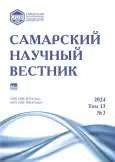Development and updating of educational modules in the field of information technology
- Authors: Tyuzhina I.V.1, Gorbatov S.V.2, Kazeev A.E.3
-
Affiliations:
- Samara State Transport University
- Ural Mining and Metallurgical Company Technical University
- Samara State University of Social Sciences and Education
- Issue: Vol 13, No 3 (2024)
- Pages: 206-212
- Section: Pedagogical Sciences
- URL: https://bakhtiniada.ru/2309-4370/article/view/280765
- DOI: https://doi.org/10.55355/snv2024133312
- ID: 280765
Cite item
Full Text
Abstract
The article analyzes the prototypes of the working programs of the training modules «Conducting in Information Technology» and «Information Technology and Programming» recommended by the Ministry of Science and Higher Education, as well as research in the field of digital literacy of Russians. The scientific novelty consists in the development of the content of the module «Introduction to information Technology», which meets the goals for the introduction of artificial intelligence technologies declared for all educational organizations of the Russian Federation. As a result, the working program of the author's module «Introduction to Information Technology» has been developed, which includes two disciplines «Digital technologies of self-education» and «Computer Science». The division is related to the difference in the goals of these disciplines: the first studies learning tools, including self-study, the second covers general digital competencies. The actualization of the discipline «Informatics» consists primarily in the inclusion of a block responsible for competence in the field of digital content creation and the replacement of the block for learning Pascal and C languages with the basics of the Python programming language, which allows us to solve another task set by the Ministry of Science and Higher Education of the Russian Federation, namely: to lay the foundation for the study of the module «Artificial intelligence systems», which is becoming mandatory for all specialties and areas of training. The educational module being formed is intended, first of all, for students of bachelor's and specialist degree educational programs aimed at training personnel for transport and related to an enlarged group of specialties and areas of training 23.00.00 – Land transport engineering and technology. The results of the study may be of interest to methodologists and scientific and pedagogical workers who are actively working on the formation of educational modules in the field of IT technologies and artificial intelligence.
Full Text
##article.viewOnOriginalSite##About the authors
Irina Viktorovna Tyuzhina
Samara State Transport University
Email: i.tyuzhina@samgups.ru
candidate of pedagogical sciences, associate professor of Digital Technologies Department
Russian Federation, SamaraSergey Vasilyevich Gorbatov
Ural Mining and Metallurgical Company Technical University
Email: s.gorbatov@tu-ugmk.com
candidate of pedagogical sciences, associate professor, head of Information Technologies Department
Russian Federation, Verkhnyaya Pyshma, Sverdlovsk RegionAlexey Evgenievich Kazeev
Samara State University of Social Sciences and Education
Author for correspondence.
Email: kazeev_a@mail.ru
candidate of pedagogical sciences, associate professor of Computer Science, Applied Mathematics and Teaching Methods Department
Russian Federation, SamaraReferences
- Модель компетенций команды цифровой трансформации в системе государственного управления / под ред. М.С. Шклярук, Н.С. Гаркуши. М.: РАНХиГС, 2020. 84 с.
- О национальных целях развития Российской Федерации на период до 2030 года: указ президента РФ от 21.07.2020 № 474 [Электронный ресурс] // Гарант.ру. https://base.garant.ru/74404210.
- О внесении изменений в федеральные государственные образовательные стандарты высшего образования: приказ Минобрнауки РФ от 26.11.2020 № 1456 [Электронный ресурс] // Гарант.ру. https://base.garant.ru/400819549.
- Перечень поручений президента Российской Федерации по итогам конференции по искусственному интеллекту: поручение президента РФ от 31.12.2020 № Пр-2242 [Электронный ресурс] // Гарант.ру. https://base.garant.ru/400165194.
- О направлении информации: письмо Минобрнауки РФ от 12.07.2021 № МН-5/4611 [Электронный ресурс] // Гарант.ру. https://base.garant.ru/402654726.
- О направлении информации: письмо Минобрнауки РФ от 02.07.2021 № МН-5/2657 [Электронный ресурс] // Гарант.ру. https://base.garant.ru/401464914.
- Информация о реализуемых образовательных программах СамГУПС [Электронный ресурс] // https://www.samgups.ru/sveden/education/eduaccred.
- Босова Л.Л., Босова А.Ю. Информатика. 10 класс. Базовый уровень. М.: Бином: Лаборатория знаний, 2017. 288 с.
- Зуев С.В. Геометрические свойства квантовой запутанности и машинное обучение // Russian Technological Journal. 2023. Т. 11, № 5. С. 19–33. doi: 10.32362/2500-316x-2023-11-5-19-33.
- Кондратьева В.А. Особенности обучения искусственному интеллекту в основной школе средствами языка программирования Python // Открытая наука 2021: сб. мат-лов науч. конф. с междунар. участием (Москва, 22 апреля 2021 г.). М.: Aegitas, 2021. С. 248–253.
- Розов К.В., Подсадников А.В. Язык программирования Python в педагогическом вузе: от основ до искусственного интеллекта // Информатика и образование. 2019. № 6 (305). С. 26–33.
- Самылкина Н.Н., Салахова А.А. Обучение основам искусственного интеллекта и анализа данных в курсе информатики на уровне среднего общего образования. М.: Московский педагогический государственный университет, 2022. 242 с. doi: 10.31862/9785426310643.
- О внесении изменений в федеральные государственные образовательные стандарты высшего образования: приказ Минобрнауки РФ от 26.11.2020 № 1456 [Электронный ресурс] // Гарант.ру. https://base.garant.ru/400819549.
- Болгова В.В., Гаранин М.А., Краснова Е.А., Христофорова Л.В. Образование после пандемии: падение или подготовка к прыжку? // Высшее образование в России. 2021. Т. 30, № 7. С. 9–30. doi: 10.31992/0869-3617-2021-30-7-9-30.
- Вынужденная цифровизация: исследование цифровой грамотности россиян в 2021 году [Электронный ресурс] // https://nafi.ru/analytics/vynuzhdennaya-tsifrovizatsiya-issledovanie-tsifrovoy-gramotnosti-rossiyan-v-2021-godu.
- Оценка цифровой готовности населения России: докл. к XXII Апр. междунар. науч. конф. по проблемам развития экономики и общества (Москва, 13–30 апреля 2021 г.) / Н.Е. Дмитриева (рук. авт. кол.), А.Б. Жулин, Р.Е. Артамонов, Э.А. Титов. М.: Изд. дом Высшей школы экономики, 2021. 86 с.
- Carretero Gomez S., Vuorikari R., Punie Y. DigComp 2.1: The Digital Competence Framework for Citizens with eight proficiency levels and examples of use, EUR 28558 EN, Publications Office of the European Union, Luxembourg, 2017 [Internet] // https://publications.jrc.ec.europa.eu/repository/handle/JRC106281.
- Выборочное федеральное статистическое наблюдение по вопросам использования населением информационных технологий и информационно-телекоммуникационных сетей за 2013–2019 гг. [Электронный ресурс] // Федеральная служба государственной статистики. https://rosstat.gov.ru/free_doc/new_site/business/it/ikt23/index.html.
Supplementary files






